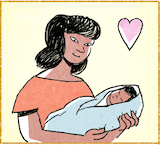


นี้พุซายกับพุหญิงแม่นบ่ แม่น นี้พุซายกับพุหญิง
เขาหน้าสิเป็นพุบ่าวพุสาวกัน หลือเป็นแฟนกันกะได้
เขายืนอยู่ใก้ๆ กัน เขาจับมือกันพ้อม เขาคือสิฮักกัน
เบิ่งซงแล้วคือสิฮักกันหลาย คือสิฮักกันกะด้อกะเดี้ย
อยู่ข้างๆ เขามีลูบหัวใจพ้อม ลูบหัวใจดวงสีซมพู
10
สองคนนี้เป็นแม่ลูกกันแม่นบ่ แม่นอยู่
พุหญิงใส่เสี้ยแขนสั้นสีส้ม ผมญาวพ้อม เป็นแม่ของเด็กน้อยคนนี้
เด็กน้อยคนนี้กำลังนอนหลับ นอนหลับเป็นตามีแฮงหลาย
เด็กน้อยนอนห่มผ้าบ่ ห่มอยู่ เด็กน้อยนอนห่มผ้าอยู่
พุหญิงคนนี้ เขากะกำลังอุ้มลูกของเขา อุ้มอยู่ในมือของเขา
พุหญิงคนนี้ฮักลูกของเขาบ่ ฮักอยู่ คือสิฮักหลาย แม่ทุกคนกะต้องฮักลูกของเจ้าของ
11
นี้เป็นเด็กน้อยพุหญิงแม่นบ่ แม่นอยู่ นี้เป็นเด็กน้อยพุหญิง ใส่เสี้ยแขนญาว เสี้ยแขนญาวสีซมพู
เขากำลังยืนอยู่พุเดียว เขายืนจับไอติมอยู่ กำลังสิกินไอติม
ไอติมมันหวานบ่ กะหน้าสิหวานอยู่ เพาะว่าไอติมเฮ็ดมาจากน้ำตาน เบิ่งซงแล้วเป็นตาหวาน
ขั้นได้กินเข้าไปแล้ว คือสิเย็นสดซื้นดี เพาะว่าไอติมเฮ็ดมาจากน้ำแข็ง
เด็กน้อยพุหญิงคนนี้มักไอติมบ่ มักอยู่ คือสิมักหลาย คือสิมักบักคักหนึ่ง
เด็กน้อยคนนี้มัดผมสองข้าง ผมของเขากะญาว ญาวพอปะมาน บ่ญาวหลาย
Link to overview page
Link to dictionary
| Isaan | Pronunciation | Tones | Thai | English/Notes |
|---|---|---|---|---|
| นี้ | ni: | HF | นี้ | 1. this 2. here |
| พุซาย | phu-sa:i | H-HR | ผู้ชาย | man, male |
| กับ | gap | M | กับ | 1. and {ลุงกับป้า = uncle and aunt} {กวยเตียวหมูกับกวยเตียวไก่ = noodle soup with pork and noodle soup with chicken} 2. with, to {ค้ายๆ กับคำว่า ... = similar to the word ...} 3. prefix in front of foods {กับเข้า = side dishes eaten with rice} {เขากินกับกวยเตียว = he's eating noodle soup} |
| พุหญิง | phu-ɲiŋ | H-M | ผู้หญิง | woman, female |
| แม่นบ่ | mɛ:n-bɔ: | H-H | ใช่ไหม | question particle: ..., right? ..., isn't it? ..., don't you? etc. {เจ้าได้เห็นสิ่งนั้นแม่นบ่ = You've seen that, haven't you?} {ฝนกำลังตกแม่นบ่ = It's raining, isn't it?} {นี้คือกะคุแม่นบ่ = This is a bucket, isn't it?} |
| แม่น | mɛ:n | H | ใช่ | 1. yes 2. affirmative particle |
| เขา | khao | M | เขา | personal pronoun: he, she |
| หน้า | na: | LF | หน้า | 1. front {ปะตูหน้า = front door} 2. face {เขากำลังล้างหน้า = he's washing his face} 3. auxiliary: conditional tense {เขาหน้าสิเป็นพุบ่าวพุสาวกัน = they are probably groom and bride} {กะหน้าสิส้มอยู่ = it's likely to be sour} 4. season {หน้าฮ้อน = hot season} 5. page 6. clf. for pages {เฮาอ่านฮอดหน้านั้นแล้ว = we've read until this page} |
| สิ | si | M | จะ | future tense auxiliary {เขากำลังสิตื่น = he's about to wake up} {สิไปตะหลาด = [I'm] going to the market} |
| เป็น | pen | M | เป็น | 1. to be, to exist 2. to be able to 3. to suffer, sth. happens to 4. เป็นหญัง[...]คือ in initial position: why? {เป็นหญังเขากะคือแปงฟัน = Why is he brushing his teeth?} {เป็นหญังเคี่ยงบินมันคือสิตก = Why is the airplane falling down?} |
| พุบ่าว | phu-ba:o | H-H | เจ้าบ่าว | groom |
| พุสาว | phu-sa:o | H-M | เจ้าสาว | 1. girl, young lady 2. bride |
| กัน | gan | M | กัน | mutual, each other, with another, together {เขากำลังนั่งเว้ากัน = they're sitting and talking} {เขาสองคนฮักกัน = they love each other} {ปาสองโตนี้ ใหญ่ห่างกันหลายบ่ = These two fish here, are they very different in size (from each other)?} {ต่างกัน = to be different (from each other)} {ก่องอันไหนหนักกว่ากัน = Which box is heavier (than the other(s))?} |
| หลือ | lʉ: | M | หรือ | or |
| แฟน | fɛ:n | HR | แฟน | partner, boyfriend/girlfriend |
| กะ | ga | M | ก็ | 1. then, consequently 2. also |
| ได้ | dai | HF | ได้ | 1. can 2. to get, to obtain 3. before verb: indicating past tense 4. บ่ได้ + verb: not |
| ยืน | yʉ:n | M | ยืน | to stand |
| อยู่ | yu: | H | อยู่ | 1. to be (located) at 2. yet, still 3. auxiliary indicating continuous or progressive action {ทอดปาอยู่ในกะทะ = (in the process of) frying a fish in the pan} {แม่กำลังเมี้ยนเฮียนอยู่ = mother is cleaning/tidying up the house} |
| ใก้ | gai | HF | ใกล้ | near, close |
| จับ | jap | M | จับ | 1. to grasp, to hold {เขาจับมือกัน = they're holding hands} {เขายืนจับไอติมอยู่ = she's standing, holding an ice cream} 2. to catch, to arrest {จับพุล้าย = to arrest a criminal} |
| มือ | mʉ: | HR | มือ | 1. hand 2. front leg/paw (e.g., of a cat) |
| พ้อม | phɔ:m | HF | พร้อม | at the same time, also, too {มีตะเว็นพ้อม = the sun's out, too} {กะทะมีด้ามพ้อม = the pan has also a handle} |
| คือ | khʉ: | HR | คือ | 1. to be, to resemble, like, as 2. why {บักหล้าคือบ่เก็บโต่ะแน่ = [addressing a young boy] Why haven't you cleared the table?} |
| ฮัก | hak | H | รัก | to love |
| เบิ่ง | bəŋ | H | ดู | 1. to look at, to see, to watch {เบิ่งโทละทัด = to watch TV} {เบิ่งหนัง = to watch a movie} 2. to guess {เบิ่งซงแล้ว ... = [I] guess / from what it looks like ...} |
| ซง | soŋ | HR | ทรง | 1. shape, form 2. as if, like Notes: translation to be confirmed |
| แล้ว | lɛ:o | HF | แล้ว | 1. finished 2. already 3. and then, and next (especially แล้วกะ) 4. auxiliary for past tense |
| หลาย | la:i | M | เยอะ, มาก | many, much, very |
| กะด้อกะเดี้ย | ga-dɔ:k-ga-di:a | M-HF-M-HF | มากมาย, มากเกินไป | intensifier: very, very much |
| ข้าง | kha:ŋ | LF | ข้าง | 1. side {มีหูจับสองข้าง = there are handles on both sides} 2. next to {วางอยู่ข้างๆ ก่องใบใหญ่ = it's placed next to the large box} {เขายืนอยู่ข้างๆ อีกพุหนึ่ง = he's standing next to another person} 3. clf. for body parts which come in pairs (eyes, ears, legs etc.) {เขามีตาสองข้าง = she has two eyes} |
| มี | mi: | HR | มี | 1. to have 2. there is |
| ลูบ | lu:p | HF | รูป | 1. picture, image, photo 2. form, shape 3. clf. for pictures, images, photos |
| หัวใจ | hu:a-jai | M-M | หัวใจ | heart |
| ดวง | du:aŋ | M | ดวง | clf. for hearts, suns, moons, stars |
| สี | si: | M | สี | 1. color 2. colored pencil, crayon |
| ซมพู | som-phu: | HR-HR | ชมพู | pink |
| สอง | sɔ:ŋ | M | สอง | two |
| คน | khon | HR | คน | person, people |
| แม่ | mɛ: | H | แม่ | mother |
| ลูก | lu:k | HF | ลูก | 1. child 2. clf. for balls, fruits (lime), mountains |
| ใส่ | sai | H | ใส่ | 1. to put something in/on {เขาใส่บักพิกในกวยเตียวหลาย = he's putting a lot of chili in his noodle soup} {เขาบีบยาสีฟันใส่แปงสีฟัน = he squeezes toothpaste on the toothbrush} {ก่องเอาไว้ใส่ของ = boxes are there to put stuff in} 2. to wear (clothes) {เขาใส่เสี้ยแขนญาว = he's wearing a long-sleeve} 3. directed at {เอิ้นใส่กัน = to call each other/to say to each other} {หมามันเห่าใส่แมว = the dog barks at the cat} {ล้องเพงใส่ไม = to sing into the microphone} {เขากำลังซี้มือไปใส่พุซาย = she's pointing at the man} |
| เสี้ย | si:a | LF | เสื้อ | shirt |
| แขน | khɛ:n | M | แขน | arm |
| สั้น | san | LF | สั้น | short |
| ส้ม | som | LF | ส้ม | 1. fruit: orange 2. color: orange |
| ผม | phom | M | ผม | hair |
| ญาว | ɲa:o | HR | ยาว | long |
| ของ | khɔ:ŋ | M | ของ | of, belonging to |
| เด็กน้อย | dek-nɔ:i | M-HF | เด็ก, เด็กน้อย | child |
| กำลัง | gam-laŋ | M-HR | กำลัง | auxiliary indicating continuous or progressive action |
| นอนหลับ | nɔ:n-lap | HR-M | นอนหลับ | to sleep |
| ตามีแฮง | ta:-mi:-hɛ:ŋ | M-HR-HR | น่าสบาย | happily, comfortably, feeling well |
| นอน | nɔ:n | HR | นอน | 1. to lie down 2. to sleep |
| ห่ม | hom | H | ห่ม | to cover, to wrap |
| ผ้า | pha: | LF | ผ้า | 1. clothes 2. cloth |
| บ่ | bɔ: | H | ไม่ | 1. no, not 2. question particle, transforming a statement into a question Notes: spelling exception in line with common usage on social media |
| อุ้ม | um | HF | อุ้ม | to hold/carry in one's arms |
| ใน | nai | HR | ใน | in, within |
| ทุก | thuk | H | ทุก | every Notes: also pronounced ทุ as in ทุมื้อๆ = everyday, always |
| ต้อง | tɔŋ | HF | ต้อง | to have to, must |
| เจ้าของ | jao-khɔ:ŋ | HF-M | เจ้าของ | 1. personal pronoun: oneself 2. owner |
| พุเดียว | phu-di:ao | H-M | คนเดียว | 1. alone, by oneself {เขากำลังยืนอยู่พุเดียว = she's standing by herself} {เขานั่งอยู่พุเดียว = he's sitting by himself} 2. one person |
| ไอติม | ai-tim | M-M | ไอติม, ไอศกรีม | ice cream |
| กิน | gin | M | กิน | to eat, to consume, to use |
| มัน | man | HR | มัน | it (also used to refer to people) |
| หวาน | wa:n | M | หวาน | sweet |
| เพาะว่า | phɔ-wa: | H-H | เพราะว่า | because |
| เฮ็ด | het | H | ทำ | to do, to make |
| มา | ma: | HR | มา | 1. to come 2. auxiliary expressing action towards the present or focal time {กะคุเฮ็ดมาจากอี่หยัง = What is the bucket made of?} {แล้วเขากะเก็บเงินจากพุนั้นมา = and then she takes the money of that person} |
| จาก | ja:k | LF | จาก | 1. from {... เฮ็ดมาจากอี่หยัง = ... is made from what?} 2. to depart |
| น้ำตาน | na:m-ta:n | HF-M | น้ำตาล | sugar |
| ตา | ta: | M | ตา | as a prefix: likely, worthy, fit for (like Thai น่า-) {ตาฮัก = lovely/cute} {ตาสะออน = praiseworthy} {ตาหวาน = (of ice cream) [likely to be] sweet} {ตาอยู่ = to be a good place to be} Notes: see also various entries for ตา-, e.g., ตาแซบ, ตาพู่ฮ้าย, ตาย้าน, ตาอยากหัว, ตาฮัก, ตามีแฮง |
| ขั้น | khan | LF | เมื่อ | when, if |
| เข้า | khao | LF | เข้า | to enter, to go inside, to come/go in/on {เข้าห้องน้ำ = to go to the bathroom} {เข้านอน = to go to bed} {ขี่เลียเข้าไปเกาะ = to take a boat to go on an island} |
| ไป | pai | M | ไป | 1. to go 2. auxiliary indicating action extending into the future |
| เย็น | yen | M | เย็น | cold, cool (air, objects) |
| สดซื้น | sot-sʉ:n | M-HF | สดชื่น | fresh, refreshed Notes: pronunciation: also realized as สดชื้น |
| ดี | di: | M | ดี | good |
| น้ำแข็ง | na:m-khɛŋ | HF-M | น้ำแข็ง | ice |
| มัก | mak | H | ชอบ | to like, to love, to want, to desire |
| บักคักหนึ่ง | bak-khak-nʉŋ | M-H-H | intensifier: very, very much (variant of คัก) | |
| มัด | mat | H | มัด | 1. to bind, to tie, to fasten, to wrap 2. clf. for bundles, bunches {มัดก้า = bundle of rice seedlings} |
| พอปะมาน | phɔ:-pa-ma:n | HR-M-HR | พอประมาณ | moderately |